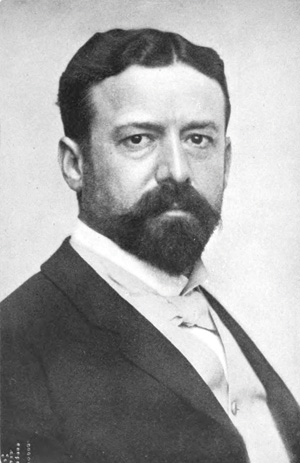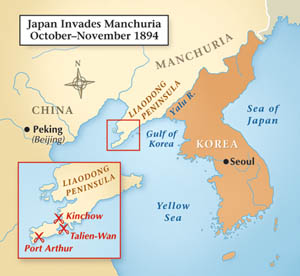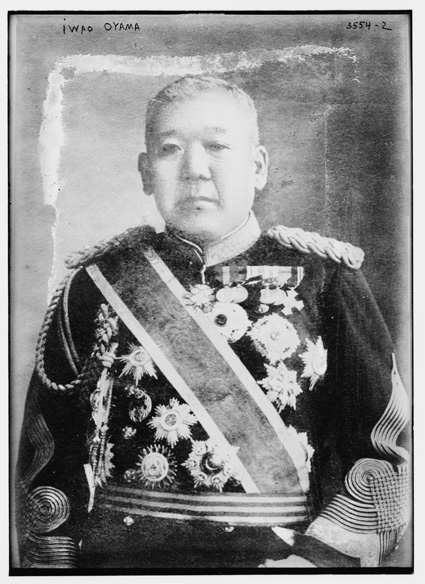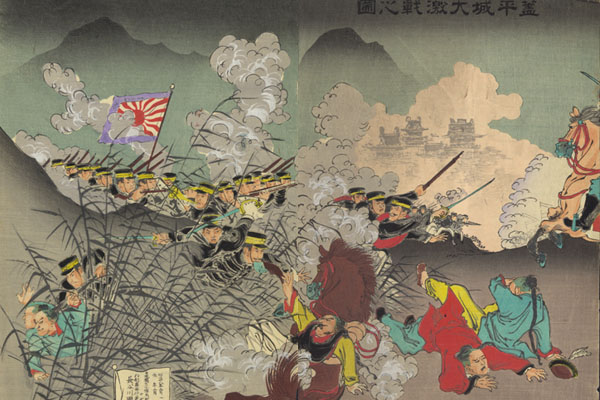This article is from the Winter 2011 issue of MHQ. Visit the HistoryNet store to order your copy today!
In his 1901 memoir, On the Great Highway: The Wanderings and Adventures of a Special Correspondent, American journalist James Creelman recounted the First Sino-Japanese War. Though the conflict lasted only nine months, from August 1894 to April 1895, Japan’s victory over China marked its emergence as a world power.
A thrill of expectant fear ran through the army as the great guns of Jokasan were turned upon the advancing Japanese regiment on the left of our line. For two hours the hills shook with the shock of the battery.
In this excerpt, Creelman, on assignment for Joseph Pulitzer’s New York World, describes Japan’s invasion of Manchuria in October and November of 1894. He traveled with a force that crossed the Yellow Sea and landed on what is now the Liao-dong Peninsula. The Japanese seized the ancient walled city of Kinchow (present-day Jinzhou) and the seven massive forts that guarded nearby Talien-Wan (Dalian Bay) on the eastern shore of the peninsula that today is home to the port city of Dalian. Not long after, the Japanese advanced on the strategic port city of Port Arthur (present-day Lüshun), a few miles south on the very tip of the peninsula, where the troops won an easy victory—then massacred thousands of Chinese civilians and soldiers, a story that Creelman reported to the shock of the world.
* * *
The steamer that carried General [Yoshimichi] Hasegawa and his brigade of Kumomoto troops to join the army of invasion on the Manchurian coast afforded endless entertainment to Frederic Villiers and me. The queer war dances and singing processions of the Japanese soldiers kept the British war artist busy at his sketchbook. Yet there was an inexpressible sense of order and neatness in all parts of the crowded troopship, a feeling of law and obedience that surpassed anything I have seen on an American or European transport.
When we reached the coast of Manchuria, a bleak stretch of uninteresting shore, backed by treeless hills and dotted here and there with tile-roofed farmhouses, the whole Japanese force—men, horses, ammunition, food, and cannons—was carried to the land in little flat skiffs. It was a marvelous feat.
But the most extraordinary thing about our landing was the appearance of hundreds of smiling, tall Manchurians, who waded out in the shallow sea and helped to pull the boats of the invaders ashore. It was not fear that induced the pigtailed giants to assist in the invasion of their soil, but a mere absence of national sentiment. We saw abundant signs of this spirit of indifference afterward, and that day the Japanese laughed heartily at the lack of patriotism in Manchuria, and predicted the swift collapse of China.
“We will take the Emperor from Peking [Beijing] in chains within three months,” said one of Hasegawa’s colonels as he rode through the mud on the shoulders of a cheerful native, playfully tickling the fellow’s thighs with his spurs.
All along the coast could be seen the steamers from which the main Japanese army, commanded by Field Marshal Count [Iwao] Oyama, had just landed, and the great fleet of warships which had convoyed the invaders across the Yellow Sea.
We were now in the Liaodong Peninsula, the ancient home of the once dreaded hosts of Manchurian horsemen, who imposed their own pigtail on the Chinese as a sign of conquest.
As the field marshal had moved on to attack the walled city of Kinchow and the seven great forts of Talien-Wan, which lay between us and Port Arthur, the mightiest fortress in Asia, we were bound to follow at once and overtake him before the fighting began.
When I reached the farmhouse where Field Marshal Oyama slept, I was glad to crawl under a blanket between two hospitable staff officers lying on a wooden couch. They sleepily informed me that nothing important had happened, but that the advance brigade, which was ahead of us, would attack the walls of Kinchow the next day. Thank God! I was not too late. In a minute I was fast asleep.
Daybreak found us in the saddle, with the fat Japanese field marshal, a good-natured, kindly old politician, riding at the head of his staff. As we moved forward, a courier arrived from the front with news that the advance guard was in sight of Kinchow. We spurred our horses and pressed on with all possible speed. At noon we halted under a huge pine tree and lunched with the field marshal, who passed about a tin pail of dried peas roasted over a fire. Each man took a handful of peas and crunched them under his teeth.
“It is all we have,” said Count Oyama, laughingly, “but eat heartily, gentlemen; if we capture Kinchow, we shall fare better tonight.”
A sudden sound of heavy cannon firing in the distance interrupted the frugal meal. The fight at Kinchow had begun. Every man leaped to his saddle, and off we went at a gallop. But, alas, when we reached the scene of the battle, Kinchow had been taken. The little walled city founded by Manchurian warriors 300 years before had been abandoned after an artillery duel of an hour, and we rode through the dynamite-shattered city gate to see the pavements stained with the blood of a few women, children, and old men, accidentally killed by shell fire, and the terrified inhabitants kowtowing on their knees to their conquerors.
We passed right through the city, and in the plain beyond we found the reserves of General [Motoharu] Yamaji’s division. The famous one-eyed division commander—the most terrible personality and the best fighter in the Japanese army—had ordered [several] brigades to attack the seven immense forts surrounding Talien Bay, six miles from Kinchow….
Here the Japanese generals expected to find a strong Chinese force, and they were prepared to lose thousands of men in the battle.
 There were three positions to be attacked. On the left of the bay was Fort Jokasan, with five five-inch rifles commanding the water; and a mighty redoubt, with three-inch Krupp fieldpieces covering the land approach. To the right of the bay, on the hills, were three large forts—Seidaisan, Cosan, and Lo-Orisan. The first two were armed with six- and seven-inch Krupp guns, and the third with six- and eight-inch Creusot guns. Stretching out in the middle of the bay was a tongue of rocky country ending in a high hill, on which were built the three powerful Oshozima forts, defended by six- and seven-inch Krupp guns.
There were three positions to be attacked. On the left of the bay was Fort Jokasan, with five five-inch rifles commanding the water; and a mighty redoubt, with three-inch Krupp fieldpieces covering the land approach. To the right of the bay, on the hills, were three large forts—Seidaisan, Cosan, and Lo-Orisan. The first two were armed with six- and seven-inch Krupp guns, and the third with six- and eight-inch Creusot guns. Stretching out in the middle of the bay was a tongue of rocky country ending in a high hill, on which were built the three powerful Oshozima forts, defended by six- and seven-inch Krupp guns.
A thrill of expectant fear ran through the army as the great guns of Jokasan were turned upon the advancing Japanese regiment on the left of our line. For two hours the hills shook with the shock of the battery. All the other guns in the chain of forts surrounding the harbor were sending shells wildly about the country. The regiment attacking Jokasan advanced at a double-quick. Then it charged. The Japanese first reached three large entrenched earthworks, from which came a sputtering musketry fire. Two or three quick volleys were fired, and a few Chinese soldiers were seen dashing away from the earthworks, stripping off their uniforms as they ran.
Suddenly the guns of Jokasan were silent. The Japanese fixed bayonets and made a charge up the huge mass of masonry and earthworks, only to find the stronghold absolutely vacant. The gunners had crossed the bay in small boats, and the rest of the garrison had sneaked away along the shore. The great fort with its magnificent guns and enormous stores of ammunition had been surrendered almost without a blow. It was an astounding situation—so inexplicable that General Yamaji suspected a masked movement. But that ended the battle for the night.
I slept that night in a Kinchow shop, lying down in the darkness on a soft wreck of merchandise, and when I awoke at daybreak I found myself stretched out on heaps of embroidered silks, with mandarins’ hats and boots and wonderful jackets and glittering ornaments scattered about in brilliant confusion, my pillow being a painted wooden monster without a head. It was like fairyland to awaken in such a scene of shimmering splendor. But I must confess that the most glorious thing in that room was a plain tin of Chicago corned beef. Such is the coarse nature of a war correspondent after a forced march on dried peas and water.
All night [Major General Maresuke Nogi’s] brigade had waited at the approach to the three Oshozima forts. Here great slaughter was expected. When there was light enough to move, the advance began across a wrinkled, stony valley. A terrific sound of gongs and drums was heard in the forts, and the brigade halted for a few minutes. The fact was that the Chinese had abandoned Oshozima during the night. They had sent back 40 or 50 soldiers to secure the personal property of the officers. These men were surprised by the Japanese, and hoping to frighten the enemy and gain time, they were pounding the alarm apparatus in the forts. The Japanese line swept straight up the giant escarpments, but not a gun was fired. They began to realize that there was no enemy before them. Here and there they could see a Chinaman skulking away.
 Then the great batteries of Lo-Orisan, on the right side of the bay, began to pour shells into Oshozima. [One] brigade boldly advanced against the three forts. For three hours there was a deafening cannonade. We could see the shells from the Creusot rifles exploding all along the hillside. But every shell went wide of the mark. The Chinese gunners ran wildly up and down behind the ramparts of the forts. When the Japanese skirmish line got within range, and their bullets began to patter over the Chinese guns, the garrison of the fort ran down the hillsides and fled toward Port Arthur.
Then the great batteries of Lo-Orisan, on the right side of the bay, began to pour shells into Oshozima. [One] brigade boldly advanced against the three forts. For three hours there was a deafening cannonade. We could see the shells from the Creusot rifles exploding all along the hillside. But every shell went wide of the mark. The Chinese gunners ran wildly up and down behind the ramparts of the forts. When the Japanese skirmish line got within range, and their bullets began to patter over the Chinese guns, the garrison of the fort ran down the hillsides and fled toward Port Arthur.
So the seven great modern strongholds of Talien-Wan fell into the hands of Japan. By 9 o’clock in the morning all was over, and a position which two regiments might have held against a whole army was given up.
As the Japanese troops were advancing against Oshozima, I rode with General Yamaji and his staff into one of the smaller entrenched works on the plain below. A Chinese shell, exploding near me, wounded my horse and threw me to the ground, breaking one of my ribs and injuring my knee. In that condition I had to ride back to Kinchow. The wounds were not serious, but the bandages which the Japanese surgeons applied were fearfully impressive, and when Mr. Villiers arrived that night—after losing his horse and walking 30 miles over the hills to find me swathed like a hero—he looked absolutely envious.
The jolly old field marshal gave the pawnshop of Kinchow to Mr. Villiers and myself as a residence. It was an interesting place. The Chinese troops had looted the storerooms before they retired from the city, and we found furs and costly silk robes and gold and silver ornaments scattered about on the ground in the courtyard, with rare old enameled headdresses, chains, and chatelaines—treasures of the local aristocracy—tangled up in piles of silver bracelets….
The next day, the white-bearded, blue-clad giant who owned the place returned and knelt down to thank us for letting him sit down in his own house. We gave him a bottle of champagne, which the field marshal had sent to us with a pair of live chickens. The old Manchurian sniffed at the foaming wine and eyed us suspiciously. Were we trying to poison him? He raised the cup again and again to his lips, shivered and set it down without tasting. Then he swallowed the cupful and waited for the sensation. His dark eyes rolled upward and his face softened. An expression of ineffable peace came into his aged countenance. Putting the bottle to his lips, he drained it, smacked his lips, and crossed his bony hands on his stomach contentedly. His eyes brightened, his cheeks grew rosy. Death had no terrors now.
“Where do you get it?” he said to our interpreter.
“In France.”
“How far away is that country? How long does it take to get there?”
Two days later, we took a walk on top of the great wall that ran around the stricken town and saw a sight of horror.
Seven women and three little girls were dragged out of a well in an old garden, and laid stiff and dripping among the faded flowers and drifting leaves. They had drowned themselves when the Japanese began to shell the place, fearing the fate that befalls women after Asiatic victories.
There they lay, entwined together in a last embrace, a silent memorial of the virtue of Manchurian women. Four were the wives of prominent men; the others were their daughters and servants.
The victorious army went rumbling on through the streets—horses, men, baggage carts, cannon—and the brilliant pageantry of the field marshal’s staff swept around the corner. But none saw the 10 stark figures in the high-walled Chinese garden; none save a group of tearful men, too cowardly to fight in defense of their homes, and the two pitying war correspondents on the city wall. MHQ
Editor’s note: Spellings and usage have been modernized.






